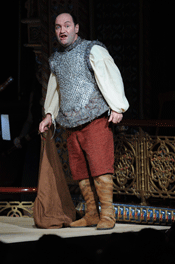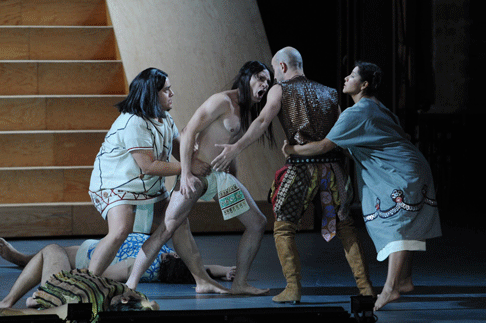Recently in Performances
English Touring Opera are delighted to announce a season of lyric monodramas to tour nationally from October to December. The season features music for solo singer and piano by Argento, Britten, Tippett and Shostakovich with a bold and inventive approach to making opera during social distancing.
This tenth of ten Live from London concerts was in fact a recorded live performance from California. It was no less enjoyable for that, and it was also uplifting to learn that this wasn’t in fact the ‘last’ LfL event that we will be able to enjoy, courtesy of VOCES8 and their fellow vocal ensembles (more below …).
Ever since Wigmore Hall announced their superb series of autumn concerts, all streamed live and available free of charge, I’d been looking forward to this song recital by Ian Bostridge and Imogen Cooper.
Although Stile Antico’s programme article for their Live from London recital introduced their selection from the many treasures of the English Renaissance in the context of the theological debates and upheavals of the Tudor and Elizabethan years, their performance was more evocative of private chamber music than of public liturgy.
Evidently, face masks don’t stifle appreciative “Bravo!”s. And, reducing audience numbers doesn’t lower the volume of such acclamations. For, the audience at Wigmore Hall gave soprano Elizabeth Llewellyn and pianist Simon Lepper a greatly deserved warm reception and hearty response following this lunchtime recital of late-Romantic song.
For this week’s Live from London vocal recital we moved from the home of VOCES8, St Anne and St Agnes in the City of London, to Kings Place, where The Sixteen - who have been associate artists at the venue for some time - presented a programme of music and words bound together by the theme of ‘reflection’.
'Such is your divine Disposation that both you excellently understand, and royally entertaine the Exercise of Musicke.’
‘And there was war in heaven: Michael and his angels fought against the dragon; and the dragon fought and his angels, And prevailed not; neither was their place found any more in heaven … that old serpent … Satan, which deceiveth the whole world: he was cast out into the earth, and his angels were cast out with him.’
There was never any doubt that the fifth of the twelve Met Stars Live in Concert broadcasts was going to be a palpably intense and vivid event, as well as a musically stunning and theatrically enervating experience.
‘Love’ was the theme for this Live from London performance by Apollo5. Given the complexity and diversity of that human emotion, and Apollo5’s reputation for versatility and diverse repertoire, ranging from Renaissance choral music to jazz, from contemporary classical works to popular song, it was no surprise that their programme spanned 500 years and several musical styles.
The Academy of St Martin in the Fields have titled their autumn series of eight concerts - which are taking place at 5pm and 7.30pm on two Saturdays each month at their home venue in Trafalgar Square, and being filmed for streaming the following Thursday - ‘re:connect’.
The London Symphony Orchestra opened their Autumn 2020 season with a homage to Oliver Knussen, who died at the age of 66 in July 2018. The programme traced a national musical lineage through the twentieth century, from Britten to Knussen, on to Mark-Anthony Turnage, and entwining the LSO and Rattle too.
With the Live from London digital vocal festival entering the second half of the series, the festival’s host, VOCES8, returned to their home at St Annes and St Agnes in the City of London to present a sequence of ‘Choral Dances’ - vocal music inspired by dance, embracing diverse genres from the Renaissance madrigal to swing jazz.
Just a few unison string wriggles from the opening of Mozart’s overture to Le nozze di Figaro are enough to make any opera-lover perch on the edge of their seat, in excited anticipation of the drama in music to come, so there could be no other curtain-raiser for this Gala Concert at the Royal Opera House, the latest instalment from ‘their House’ to ‘our houses’.
"Before the ending of the day, creator of all things, we pray that, with your accustomed mercy, you may watch over us."
The doors at The Metropolitan Opera will not open to live audiences until 2021 at the earliest, and the likelihood of normal operatic life resuming in cities around the world looks but a distant dream at present. But, while we may not be invited from our homes into the opera house for some time yet, with its free daily screenings of past productions and its pay-per-view Met Stars Live in Concert series, the Met continues to bring opera into our homes.
Music-making at this year’s Grange Festival Opera may have fallen silent in June and July, but the country house and extensive grounds of The Grange provided an ideal setting for a weekend of twelve specially conceived ‘promenade’ performances encompassing music and dance.
There’s a “slide of harmony” and “all the bones leave your body at that moment and you collapse to the floor, it’s so extraordinary.”
“Music for a while, shall all your cares beguile.”
The hum of bees rising from myriad scented blooms; gentle strains of birdsong; the cheerful chatter of picnickers beside a still lake; decorous thwacks of leather on willow; song and music floating through the warm evening air.
Performances
![Flavio Oliver as Montezuma [Photo courtesy of Festival Internacional Cervantino]](http://www.operatoday.com/CCC_1231.gif)
01 Nov 2010
Cervantino stages rare Graun opera — The Mexican national opera?
Clearly, there isn’t one. Yet, Carl Heinrich Graun’s 1755
rarely-performed Montezuma is of special importance in a country
celebrating 200 years of Independence from Spanish rule and 100 years since the
Revolution that ultimately toppled dictator Porfirio Díaz.
Montezuma
was thus an obvious choice as the operatic centerpiece of the 2010
International Cervantino Festival, staged in Guanajuato, a major station on the
march to Mexican freedom that began in 1810.
Although he was his contemporary, Graun was no Handel, and thus
Montezuma, even when performed with the dedication obvious in the
production seen in the historic Teatro Juárez on October 14, is more
conversation piece than masterwork. The libretto by Graun’s employer,
Prussia’s music-loving, flute-playing Frederick the Great, was performed
in Guanajuato in Italian translation.
 Christophe Carré countertenor as Panfilo de Narvaes
Christophe Carré countertenor as Panfilo de Narvaes
The somewhat simplistic plot reflects Frederick’s desire to be seen as
an apostle of the Enlightenment — despite his own absolute power.
Montezuma is an embodiment of the monarch’s philosophical
leaning vis-à-vis the Noble Savage. (Recall that this is also the age of
Jean-Jacques Rousseau, with Voltaire being in residence at Frederick’s
court.)
Mexico’s opera Wunderkind Claudio Valdés Kuri brought all the
excesses of Regietheater to the minimalist staging, trying too hard to
make more of Montezuma than is really there. Intent of fitting the
work into the theme of the season, Kuri employed all the techniques of
Brechtian alienation to combine in the production a picture of Mexico’s
inhuman suffering with a vision of hope for the future. Thus in the title role
countertenor Flavio Oliver frequently swapped Aztec loin cloth with T-shirt,
and in Act III Kuri changed the entire 26-member Elyma Ensemble, an able but
undistinguished early-music group, into “civvies” and moved them
onto the stage. This act concluded not with Graun’s original score, but
with a dramatic scene by Mexican Baroque composer Manuel de Sumaya. As
Montezuma died, half the stage was wrapped in a modern Mexican flag. The
substituted finale seemed to suggest an eventual and successful synthesis of
cultures. Yet one wondered— to cite only one from many examples—
whether Cortés on-stage rape of heroic Montezuma did not detract from the
figurative rape of ancient Mexico that is the true subject of the Graun’s
opera.
Oliver, by far the finest voice— and actor— in the cast, was a
virile Montezuma in the minimalist staging, designed by Herman Sorgeloos. As
conqueror Cortés Adrian’s George Popescu, an equally able countertenor,
was the embodiment of the Absolute Evil that brought about the end of Aztec
civilization.

As Montezuma’s mate, soprano Lourdes Ambriz grew in stature as she
suffered ever-greater abuse throughout the performance. She made her lament in
Act III a memorable moment in an otherwise often tedious evening of opera.
Without distorting the figure, Kuri took advantage of Ambriz’ talent to
bring a hint of feminist thought to the production. Gratefully, Kuri trimmed
his staging to three hours from the original four. It was also to Kuri’s
credit that he corrected Frederick’s idealist picture of Montezuma with
an opening scene that showed that his hands too were soiled with the blood of
innocent victims.
A co-commission Germany’s Theater der Welt and the Edinburgh Festival
(it was staged by both earlier this year), the Cervantino, Madrid’s
Teatro, where it recently played. It is yet to be seen in Mexico City.
Wes Blomster
![Flavio Oliver as Montezuma [Photo courtesy of Festival Internacional Cervantino]](http://www.operatoday.com/CCC_1231.gif)

